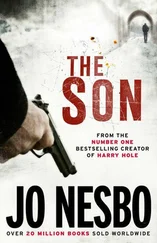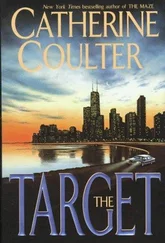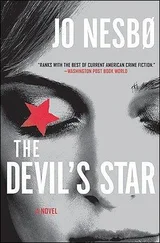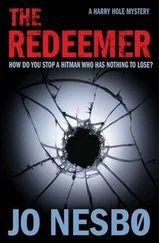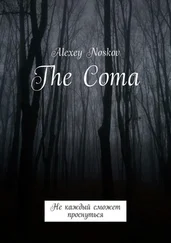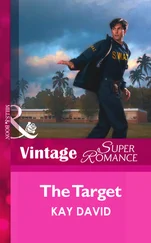Jo Nesbo - The Thirst
Здесь есть возможность читать онлайн «Jo Nesbo - The Thirst» весь текст электронной книги совершенно бесплатно (целиком полную версию без сокращений). В некоторых случаях можно слушать аудио, скачать через торрент в формате fb2 и присутствует краткое содержание. Год выпуска: 2017, ISBN: 2017, Издательство: Random House, Жанр: Триллер, на английском языке. Описание произведения, (предисловие) а так же отзывы посетителей доступны на портале библиотеки ЛибКат.
- Название:The Thirst
- Автор:
- Издательство:Random House
- Жанр:
- Год:2017
- ISBN:9781911215288
- Рейтинг книги:5 / 5. Голосов: 1
-
Избранное:Добавить в избранное
- Отзывы:
-
Ваша оценка:
- 100
- 1
- 2
- 3
- 4
- 5
The Thirst: краткое содержание, описание и аннотация
Предлагаем к чтению аннотацию, описание, краткое содержание или предисловие (зависит от того, что написал сам автор книги «The Thirst»). Если вы не нашли необходимую информацию о книге — напишите в комментариях, мы постараемся отыскать её.
The Thirst — читать онлайн бесплатно полную книгу (весь текст) целиком
Ниже представлен текст книги, разбитый по страницам. Система сохранения места последней прочитанной страницы, позволяет с удобством читать онлайн бесплатно книгу «The Thirst», без необходимости каждый раз заново искать на чём Вы остановились. Поставьте закладку, и сможете в любой момент перейти на страницу, на которой закончили чтение.
Интервал:
Закладка:
‘Grey,’ his wife added.
Truls nodded to the policeman, who understood the signal and began talking into the radio that was clipped to the top pocket of his jacket. ‘Request assistance to Hovseterveien 44. Suspect observed heading on foot towards the metro, fifteen minutes ago. Approximately 1 metre 75, possibly ethnic Norwegian, grey suit.’
Fru Amundsen had come out from behind the door. She seemed even less steady on her feet than her husband, and her slippers dragged on the floor as she pointed a trembling finger at the woman on the wall. She reminded Truls of one of those pensioners they used to clear snow for. He raised his voice: ‘I said, don’t come any closer!’
‘But—’ the woman began.
‘Inside! Murder scenes mustn’t be contaminated before Forensics gets here, we’ll ring on the door if we have any questions.’
‘But … but she’s not dead.’
Truls turned round. In the light from the open door, he saw the woman’s right foot quiver, as if it was cramping. And the thought popped into his head before he could stop it. That she was infected. She had become a vampire. And now she was waking up.
12
SATURDAY NIGHT
THERE WAS A loud noise of metal on metal as the bar carrying the weights hit the cradle above the narrow bench. Some people would think it a terrible sound, but for Mona Daa it was like bells chiming. And she wasn’t bothering anyone else either, she was on her own at Gain Gym. They’d switched to twenty-four-hour opening six months ago, presumably inspired by gyms in New York and Los Angeles, but Mona still hadn’t seen anyone else exercising there after midnight. Norwegians simply didn’t work enough hours for it to be a problem finding time for the gym during the day. She was the exception. She wanted to be the exception. A mutant. Because it was like evolution, it was the exceptions who drove the world forward. Who perfected things.
Her phone rang, and she got up from the bench.
It was Nora. Mona put her earphone in and took the call.
‘You’re at the gym , bitch,’ her friend groaned.
‘I haven’t been here long.’
‘You’re lying, I can see that you’ve been there for two hours.’
Mona, Nora and a few of their other friends from college could find each other using the GPS on their mobiles. They’d activated a service that allowed them to voluntarily track the others’ phones. It was both sociable and reassuring. But Mona couldn’t help thinking that it felt a bit claustrophobic at times. Professional sisterhood was all well and good, but they didn’t have to follow each other about like fourteen-year-olds going to the toilet together. It was high time they realised that the world was full of career opportunities for intelligent young women, and that the only thing holding them back was their own lack of courage and ambition, ambition to make a difference, not just get the others’ validation of their own smartness.
‘I hate you just a tiny bit when I think of all the calories that are falling off you right now,’ Nora said. ‘While I’m sitting here on my fat arse consoling myself with another pina colada. Listen …’
Mona felt like pulling the earphone out as the sound of drawn-out slurping through a straw battered her eardrum. Nora believed that a pina colada was the only antidote to premature autumn depression.
‘Did you actually want to talk about anything, Nora? I’m in the middle of—’
‘Yep,’ Nora said. ‘Work.’
Nora and Mona had been at the College of Journalism together. A few years ago the college had had stricter entrance requirements than any other higher education establishment in Norway, and it had seemed as if every other clever little boy or girl’s dream was to get their own newspaper column or a job on television. That had certainly been the case for Nora and Mona. Cancer research and running the country were for people who weren’t quite as bright. But Mona had noticed that the College of Journalism now had competition from all the local high schools that were using their state funding to offer Norwegian youngsters popular courses in journalism, film, music and beauty therapy, with no consideration of the kind of qualifications the country lacked and actively needed. Which meant that the richest country in the world had to import those skills while the nation’s carefree, unemployed, film-studying sons and daughters were left sitting at home with their drinking straws stuck deep in the state’s milkshake while they watched – and, if they could be bothered, criticised – films made abroad. Another reason for the falling entrance requirements was of course that the boys and girls had discovered the blog market and no longer needed to work hard for the grades with which to achieve the same level of attention offered by the more traditional route of television and the newspapers. Mona had written about this, about the fact that the media no longer demanded professional qualifications from its journalists, with the result that aspiring reporters no longer made the effort to acquire them. The new media environment, with its increasingly banal focus on celebrity, had reduced the role of journalists to that of the town gossip. Mona had used her own newspaper, the biggest in Norway, as an example. The article never got published. ‘Too long,’ the features editor had said, referring her to the magazine editor. ‘Well, if there’s one thing the so-called critical press doesn’t like, it’s being criticised,’ as one more positively inclined colleague explained. But Mona had a feeling that the magazine editor hit the nail on the head when she said: ‘But, Mona, you haven’t got any quotes from celebrities here.’
Mona went over to the window and looked out over Frognerparken. It had clouded over, and apart from the illuminated paths an almost tangible darkness had settled on the park. It was always like that in autumn, before the trees lost their leaves and everything became more transparent, and the city once again became hard and cold. But from late September to late October, Oslo was like a soft, warm teddy bear that she just wanted to hug and cuddle.
‘I’m all ears, Nora.’
‘It’s about the vampirist.’
‘You’ve been told to get him on as a guest. Do you think he does chat shows?’
‘For the last time, The Sunday Magazine is a serious discussion programme. I’ve called Harry Hole but he said no, and told me that Katrine Bratt is leading the investigation.’
‘But isn’t that good? You’re always complaining about how hard it is to find good female guests.’
‘Yes, but Hole is, like, the most famous detective we’ve got. You must remember that time when he was drunk live on air? A scandal, obviously, but people loved it!’
‘Did you tell him that?’
‘No, but I said that television needs celebrities, and that a famous face could attract more attention to the work the police do in this city.’
‘Ingenious. But he didn’t go for it?’
‘He said if I wanted to get him on Let’s Dance to represent the police, he’d start practising his slow foxtrot tomorrow. But that this was about a murder investigation, and that Katrine Bratt was the one with all the facts and the mandate to speak.’
Mona laughed.
‘What?’
‘Nothing. All I can see now is Harry Hole on Let’s Dance .’
‘What? Do you think he meant it?’
Mona laughed even louder.
‘I was just calling to hear what you think of this Katrine Bratt, seeing as you move in those circles.’
Mona picked up a pair of light dumbbells from the rack in front of her and did some quick bicep curls to keep her circulation going and to shift waste products out of her muscles. ‘Bratt’s intelligent. And articulate. A bit severe, maybe.’
Читать дальшеИнтервал:
Закладка:
Похожие книги на «The Thirst»
Представляем Вашему вниманию похожие книги на «The Thirst» списком для выбора. Мы отобрали схожую по названию и смыслу литературу в надежде предоставить читателям больше вариантов отыскать новые, интересные, ещё непрочитанные произведения.
Обсуждение, отзывы о книге «The Thirst» и просто собственные мнения читателей. Оставьте ваши комментарии, напишите, что Вы думаете о произведении, его смысле или главных героях. Укажите что конкретно понравилось, а что нет, и почему Вы так считаете.

